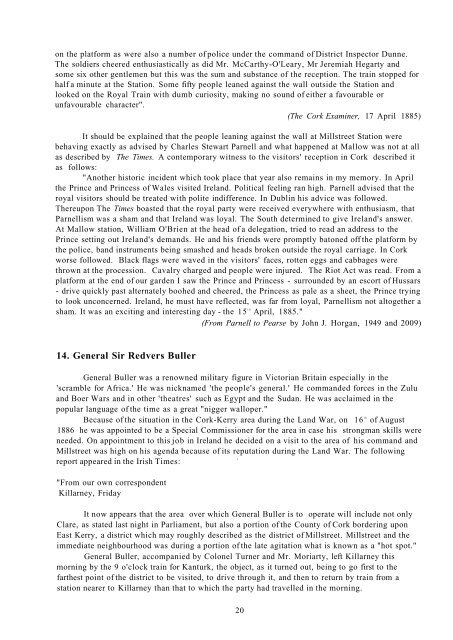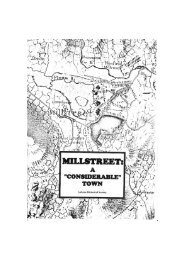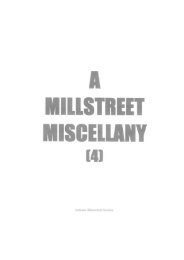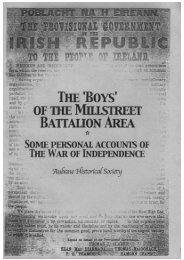A Millstreet Miscellany (3) - Aubane Historical Society
A Millstreet Miscellany (3) - Aubane Historical Society
A Millstreet Miscellany (3) - Aubane Historical Society
Create successful ePaper yourself
Turn your PDF publications into a flip-book with our unique Google optimized e-Paper software.
on the platform as were also a number of police under the command of District Inspector Dunne.<br />
The soldiers cheered enthusiastically as did Mr. McCarthy-O'Leary, Mr Jeremiah Hegarty and<br />
some six other gentlemen but this was the sum and substance of the reception. The train stopped for<br />
half a minute at the Station. Some fifty people leaned against the wall outside the Station and<br />
looked on the Royal Train with dumb curiosity, making no sound of either a favourable or<br />
unfavourable character".<br />
(The Cork Examiner, 17 April 1885)<br />
It should be explained that the people leaning against the wall at <strong>Millstreet</strong> Station were<br />
behaving exactly as advised by Charles Stewart Parnell and what happened at Mallow was not at all<br />
as described by The Times. A contemporary witness to the visitors' reception in Cork described it<br />
as follows:<br />
"Another historic incident which took place that year also remains in my memory. In April<br />
the Prince and Princess of Wales visited Ireland. Political feeling ran high. Parnell advised that the<br />
royal visitors should be treated with polite indifference. In Dublin his advice was followed.<br />
Thereupon The Times boasted that the royal party were received everywhere with enthusiasm, that<br />
Parnellism was a sham and that Ireland was loyal. The South determined to give Ireland's answer.<br />
At Mallow station, William O'Brien at the head of a delegation, tried to read an address to the<br />
Prince setting out Ireland's demands. He and his friends were promptly batoned off the platform by<br />
the police, band instruments being smashed and heads broken outside the royal carriage. In Cork<br />
worse followed. Black flags were waved in the visitors' faces, rotten eggs and cabbages were<br />
thrown at the procession. Cavalry charged and people were injured. The Riot Act was read. From a<br />
platform at the end of our garden I saw the Prince and Princess - surrounded by an escort of Hussars<br />
- drive quickly past alternately boohed and cheered, the Princess as pale as a sheet, the Prince trying<br />
to look unconcerned. Ireland, he must have reflected, was far from loyal, Parnellism not altogether a<br />
sham. It was an exciting and interesting day - the 15 th<br />
April, 1885."<br />
(From Parnell to Pearse by John J. Horgan, 1949 and 2009)<br />
14. General Sir Redvers Buller<br />
General Buller was a renowned military figure in Victorian Britain especially in the<br />
'scramble for Africa.' He was nicknamed 'the people's general.' He commanded forces in the Zulu<br />
and Boer Wars and in other 'theatres' such as Egypt and the Sudan. He was acclaimed in the<br />
popular language of the time as a great "nigger walloper."<br />
Because of the situation in the Cork-Kerry area during the Land War, on 16 th<br />
of August<br />
1886 he was appointed to be a Special Commissioner for the area in case his strongman skills were<br />
needed. On appointment to this job in Ireland he decided on a visit to the area of his command and<br />
<strong>Millstreet</strong> was high on his agenda because of its reputation during the Land War. The following<br />
report appeared in the Irish Times:<br />
1<br />
"From our own correspondent<br />
Killarney, Friday<br />
It now appears that the area over which General Buller is to operate will include not only<br />
Clare, as stated last night in Parliament, but also a portion of the County of Cork bordering upon<br />
East Kerry, a district which may roughly described as the district of <strong>Millstreet</strong>. <strong>Millstreet</strong> and the<br />
immediate neighbourhood was during a portion of the late agitation what is known as a "hot spot."<br />
General Buller, accompanied by Colonel Turner and Mr. Moriarty, left Killarney this<br />
morning by the 9 o'clock train for Kanturk, the object, as it turned out, being to go first to the<br />
farthest point of the district to be visited, to drive through it, and then to return by train from a<br />
station nearer to Killarney than that to which the party had travelled in the morning.<br />
20





